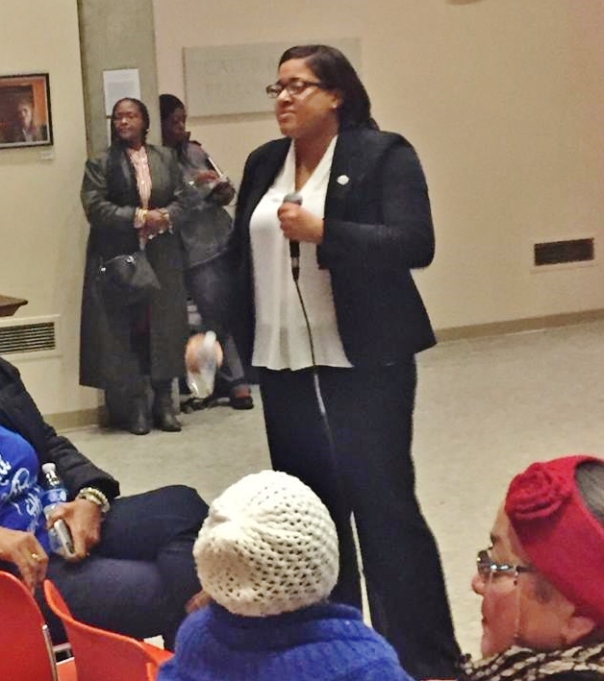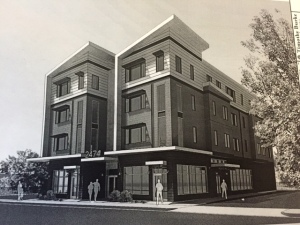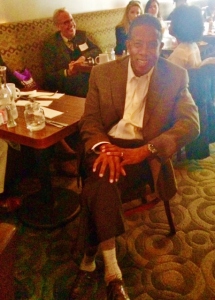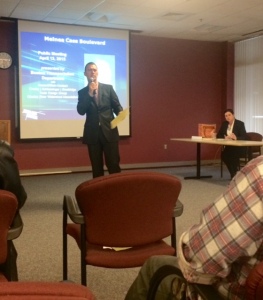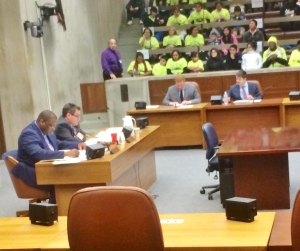
^ The locus of Innovation aspirations in today’s Roxbury : a reach too far, or a shore to be conquered ?
As we of today’s Roxbury know, our experiment, once new, has become the locus of many waves of re-newal. This we approve, for the excitement and creed of the new are what keep us rom returnng to old injustices. So it is that, of late, the Square named after myself has welcomed the latest renovation : what the sponsors thereof call the “Roxbury Innovation District.”
I have attended gatherings of the mission’s backers and of those it is sending into our New World — for is not what they call “innovation” a world unto itself, with its own orbit and gravity ? — and I have seen its promise and also seen its uncertainty.
When we first came to this place, our coming was itself innovation; for “Roxbury: did not exist, and it was unprecedented that it should come into existence. We could not have succeeded without the backing of merchants of the City of London; without t.he voices of our ministers to inspire us; without planters willing to create plantations where there had been only puddingstone and brush; without families ready to accompany our planters into the unknown, families from all over England who made commitment to do or die.
Can the sponsors of the “Roxbury Innovation District” succeed on less ? Perhaps; because the apparatus of a town (now city) is in place; because the needs of an “Innovation Center” are known; and becsuse the planters are already here besides. This time, only the doing remains to accomplish.
Yet the components of planting Innovation include all that brought our first Roxbury to success : critical investment of merchant funds; voices of inspiration; and, most important of all, a task. For our first Roxbury, the task was to plant. For the “Innovation” Roxbury the task, as i envision, is to invent.
It is not enough to pick a locus. One must conceive; and said concepts must persuade the merchant financiers of the value thereof; and that the people seeking to invent have the abilities necessary to wrestle said inventions into actual shape.
It was no different for us; and the makers of Roxbury “Innovation’ should hold i mid our example as they seek their new.
Said tocsin being sounded by me, Thomas Dudley, what assessment may we take of Innovation Roxbury thus far ? Below I offer the observation of a friend, Ed Lyons, who is the chief executive officer, in Boston proper, of a technology “start-up,” as technologists term their explorations. To which I append my own observation.
—- —-
Saieth Ed Lyons :
Can government create innovation and prosperity all by itself?
I decided to check up on this effort with my kids yesterday.
Mayors Menino and Walsh have spent more than $100 million of my tax dollars trying to create an “Innovation District” in Dudley Square in Roxbury, Boston. This project has been going on for years. The intent is noble – try to bring entrepreneurship to the largely black community of Roxbury. (I’m all for that.)
I get why they chose Dudley for this experiment. It has a great old bus station with interesting architecture that has tons of buses coming and going, including the Silver Line. It isn’t that far from the Fenway Colleges (Mass Art, Wentworth, Northeastern, etc). There are two huge police stations nearby to provide a feeling of comfort
But the keystone of this project is the massive renovation and expansion of the Ferdinand building, renaming it the Bolling building. They have moved about 500 Boston Public School back-office employees (clerical staff) there. They got a nice deli to take up some of the bottom floor. They will have an “incubator” in that building where startups can live and potentially help out the school system.
There is lots of happy-talk about how great this is all going to be, even though there have been many problems and delays with the project.
I could write a lot about this, but here are some highlights about my thoughts. I think I’m the kind of civic-minded tech entrepreneur that would find this place appealing, right?
1. Of all low-income neighborhoods to choose from in the southern half of Boston, I *get* why they picked this one – both politically, and practically. If we had to do this kind of project, I’d probably choose this spot also.
2. So much of why startups want to locate in certain places is because of who is there and what they are doing. It’s all about being near people and institutions that can help. I can’t see a less desirable group of people to be around than the back-office staff of BPS. I worked with them a lot several years ago when my wife and I worked on the BPS website down at Court Street. Nice people working in same clerical jobs for years. Unionized to the max. Uninterested in changes. They leave work at 5 on the button every day. Comfortable with their filing cabinets all around them. Oh, yeah – they need new technology and ideas. They need startups around them. But I doubt they would absorb anything. And what’s in it for the startups? I spent about 90 minutes there looking at what businesses were there. Nothing that would interest me. Nevermind there isn’t a nice bar or restaurant that I’d go to. They’ve got the nice deli in the building. That’s it. One place.
3. The advantage of the colleges nearby was way smaller than I would have thought. My kids and I walked from the Fenway schools all around the neighborhoods between Ruggles and Dudley. Tons and tons of public and low-income housing. Some of it was absolutely wonderful, like Madison Park. Some of it wasn’t. But once you walk through all that, Northeastern and Wentworth might as well be 100 miles away. Nobody from those places will ever step foot in Dudley Square on the way to anything.
4. There appears to be no diversity there. It feels *really* strange saying that. But it’s a thoroughly African-American place. I saw many people there. Not one white. (My kids and I – dressed in preppy clothes – got some strange looks as we were clearly out of place.) All murals are of all black people. Many streets are named after black people. Many businesses cater to black people (such as women’s hair places.) The modified building was changed to name of first black city council president. Even the rice bowls in the one deli are named after black women. There is absolutely, positively nothing wrong with any of this. It’s their neighborhood and their history. (Yes, I know – someone will tell me that it’s very diverse, despite all the facts I have just listed. But to me – a white startup guy – I didn’t see the diversity that young people want in tech startups at all.)
5. There just isn’t enough there to attract me. If there were a few cool bars and restaurants, that would be a huge help. I also was turned off by the 99 cent store, the steel nighttime gratings that the stores pull down over their store fronts to feel safe at night, and lots of unemployed men just hanging around in groups drinking out of paper bags and talking loudly on the street.
6. Politics have hampered and will continue to cause problems. There are fights over unionization of a nearby hotel, delaying the project years. Locals want businesses to be black-owned. They want a way better neighborhood but don’t want rents to go up or for anyone to be displaced. They don’t want outside bars or restaurants coming in. (This isn’t how other innovation districts succeeded.)
So ultimately, I don’t see how this would work. Perhaps the goal isn’t to draw in people from the outside, but get innovators from Roxbury to build businesses there. If that’s the case – God bless them. We need them. But if the goal is to get people from outside Roxbury to locate or re-locate there – if the goal is to compete with other places in the city, I don’t see that working at all.
Yes, my friend Jascha – the city CIO – might be able to get ed-tech startups in that building to help the school system. He’s probably the most innovative and amazing guy in city government. But he’s already stretched thin. He can’t do everything. Outsiders have to buy into what the city is doing there.
We will see how it goes. I will return again to see how it is going. I hope it works. Somehow.
— Ed Lyons, CEO of AdMixter, Inc.
—— —-
Now to my own observations.
It should be remembered that when we first planted “Roxbury,” we were given charter by Parliament and King, but nothing further, as it was their wish merely to be rid of us and our contraventions.
Said Parliament and King were also mindul that previous attempts at plantation, made with their sponsorship and by their procedures, either had failed or survived merely. Yet we who planted Roxbury entirely of our own, and by our own devisement, succeeded.
I do not agree with Mr. Lyons that the moving of 500 Boston Public School staff into the Bruce Bolling Building is a negative. Said workers bring spending money into Roxbufy; purveyors of things that people spend money on are sure to set up shop thereall to provide; if not yet, then soon enough.
Nor do i agree that the ubiquity of place names memorial of only one era of Roxury, people of color dominating both place and soul, in any way impedes the launch of Roxbury “Innovation.” What is in a name to one may be of no matter at all to another; and I know of none to whom said Roxbury names give offence.
Nor does the prevalence, in the streets abutting the “Innovation,” of unemployed men loitering with beers defeat the Innovation experiment. Nor the presence of grated shop fronts. In great cities newess arises cheek by jowl with unpleasantness. So we ourselves arose in a London much dirtier and lurking than the Roxbury of now.
Where I do agree with my friend, however, is the predominance of good intentions over needful apparatus. Innovation, as he has written, cannot occur merely because we want. There must be innovators; and they must have innovations in mind that command financers to say “yes, that can work.” I agree as well that Innovation doth not prosper in isolation; discussion and rivalry seem required. Was it not thus with us of 1630 ?
As well I agree with Mr. Lyons that Innovation doth not everything; that expectations of it may outrun the actual; that political leaers may abuse the Innovation idea for their own, electoral sleight, or oppose it for advantage; said politics has befallen Roxbury inovation to its detriment. Mr. Lyons cites the matter of a hotel proposed, nearby to Dudly Square, by a builder and the opposition to it, on political grounds, that has set said proposal back. This week approval thereof was given by the Board that oversees such matters; yet the memory of a year’s delay lingers in the minds of persons who might otherwise be persuaded to finance Roxbury Innovation.
The Innovation experiment in Roxbury has neither succeeded yet nor failed. It is, as it were, en route — as were we, during the long passage by ship from Portsmouth to our landing on Boston shore. No one could tell, during our passage, whether we would safely land or be driven by storms to our doom. We sailed day after day under the mercy of weather.
Thus with Roxbury Innovation today. It saileth from a safe shore to an uncertain one with less provisions aboard than it might need, less diversity of origin than discussion may benefit from, and perhap with insufficient skill to devise. It has not been a well founded launch nor one accompanied by a lifesaving fleet. Yet neither was our 1630 sailing so provided; yet we succeeded.
Roxbury innovation must be cut free of interference, the complicated court games of government set aside, to succeed in the only way that success is assured : on its own.
—- Thomas Dudley / The Dudley Files
